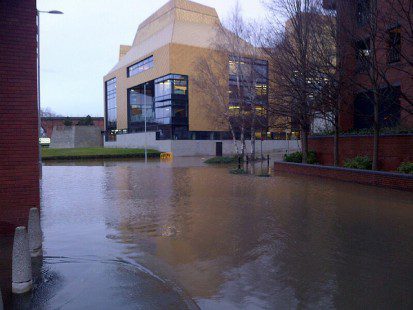The cost of doing nothing
As the recent floods in the UK have shown, our current political leaders in the coalition government seem reluctant to do more than dip their toes in the water when it comes to tackling climate change.
Despite the (controversial) recommendations of the Stern Report in 2006 that the world would have to spend 1% of its Gross Domestic Product now to avert catastrophic effects of climate change, but that doing nothing is likely to later cost 5 to 20 times as much, this Government still seems reluctant to lead on this critical issue (despite David Cameron pledging 2010 that this coalition would be the “greenest government ever”!).
The floods do demonstrate the potential costs of inaction or inadequate action, as climate change models forecast disruption on a much larger scale compared to those experienced in recent weeks. The 2007 floods have been estimated to cost over £3billion and figures for the 2014 floods are already over £1billion.
Given that the current welfare reforms are aiming to save £18 billion a year, the impact of climate change is a significant expenditure that could have been used to safeguard other essential services. The cost of doing nothing therefore isn’t just the increased cost in the future, but also the costs of not being able to use that money to support other social goods in the present.
Lessons from history
The coalition government might do well to look back at history. The changes to the climate that occurred as a result of the Laki volcano in Iceland over the summers of 1784-1785 lead to cool summers and poor harvests in northern Europe. This lead to the famine and resulting unrest in Paris which were significant factors in igniting the revolution, and we all know how that ended for the monarchy, aristocracy and political leaders of the time. We take food security and ‘business as usual’ for granted at the start of the 21st Century, but history shows us things can change very quickly.
The need for effective leadership
We desperately need leadership and support for positive change to bring about a more sustainable world, and if our political leaders are reluctant to take on the task (although the report ‘Responsibility & Resilience: What the Environment means to Conservatives’, published on the 26th February 2014 by the Conservative Environment Network, may offer a glimmer of hope) then the current generation of students need to engage their aspirations and energies to help bring about the needed processes of change.

Most people now seem to understand that climate change is an immediate issue, and that without some fairly radical economic and social leadership we will face serious consequences in the near future. But no one believes there is a political solution available. Politicians do not have the vision or will to address the problems effectively. Our political system militates against long term strategy. Our media militates against the discussion of challenging or difficult ideas.
The logical response to this political vacuum should be mass support for the Green Party with all the other political groups vying for credibility on environmental issues, but instead we see manipulation of the media and public opinion through scare stories about immigration and terrorism.
Inevitably this leads to a pessimistic and defeatist attitude by most people. What is the point? What can we do? It turns out recycling our bottles may not have been enough.
What should we do?
A really insightful piece, John.
I think short-termism is a major reason for the long-term problems we are now facing.
Ordinary people are focussed on getting by this week or month. Big business is primarily interested in how much profit they can return to their shareholders in this quarter and politicians are only concerned with getting elected at the next general election.
How can we break this deadlock?